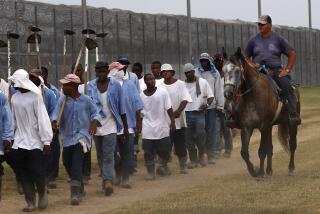2 Ex-Workers Say They Were Offered Money to Join Suit : Courts: Testimony at sentencing hearing of Somis flower rancher Edwin M. Ives backs that of other defense witnesses. Prosecution denies a deal was discussed.
- Share via
Two laborers who worked for Somis flower rancher Edwin M. Ives testified at a federal sentencing hearing Monday that they were offered financial inducements to join a lawsuit that claims Ives virtually enslaved workers and cheated them out of their rightful pay.
Augmenting testimony of two previous defense witnesses, the laborers told U.S. District Judge Consuelo B. Marshall that Ives treated them well. And they contradicted prosecution charges that workers were forced to live in squalid conditions at his 50-acre compound.
Attorneys for Ives, who pleaded guilty to numerous labor and immigration charges last year, are trying to show that dozens of former employees turned on the rancher in a civil lawsuit and the criminal prosecution because they hoped to enrich themselves.
The lawyers want to convince Marshall that Ives, who faces up to 16 years in prison, should be placed on probation instead of in a federal penitentiary.
Sentencing is not expected until May, since the final sentencing hearing was continued until April 26.
During slow-moving testimony Monday, two loyal Ives employees--a Guatemalan teacher-turned-laborer and a villager from rural Mexico--said they were grateful for the opportunity Ives gave them. So they refused to join a lawsuit against the rancher filed by California Rural Legal Assistance (CRLA) in Oxnard.
Laborer Apolinar Santiago Juarez, 43, described his first meeting with a CRLA attorney who accompanied a federal prosecutor to his mountaintop village in 1990, when both lawyers were looking for witnesses.
“He told me that my reward must be between $5,000 and $10,000,” Santiago said.
A second witness, Mario Sanchez, 30, also said that in his first encounter with a CRLA lawyer, he was asked to “find out from other guys whether they want to get some money out of this.”
Sanchez said he told the lawyer “that I was the one that owed” Ives, because the rancher helped bring the laborer’s family to this country from Guatemala.
Prosecutors said Sanchez and Santiago were hardly typical Ives employees. Sanchez testified that he is a cousin of two Ives foremen, who are also defendants in the case.
And Santiago said he signed a 1990 statement saying conditions on the Ives ranch were good at the recommendation of an Ives foreman whom he had called about re-employment at the ranch.
Santiago acknowledged that he has lived in the United States legally since then as a designated material witness for the defense, working continuously at Ives’ ranch except for a two-week vacation.
The two CRLA attorneys then involved in the Ives civil suit denied wrongdoing. While the payment of back wages was one possible result of the suit, the lawyers said they never promised a payoff.
“We never promised people money,” said Marco Antonio Abarca, who has since left the poverty law firm. “It would be unethical and unprofessional and stupid for me to do that. We’d never do it.”
Lee Pliscou, head of the CRLA’s Oxnard office, said he could not remember the discussion described by Sanchez or if he was even the attorney involved. But he denied ever luring plaintiffs to the case with offers of money.
“We turn away hundreds of cases,” he said. “We don’t need to go out recruiting clients.”
Ives, 56, pleaded guilty last year to corporate racketeering, the federal government’s first organized-crime conviction in a civil-rights case.
He also agreed to pay $1.5 million in back wages to 300 former workers, the stiffest fine ever levied in a U.S. immigration case. That equates to $1,000 to $15,000 per worker, with the 29 plaintiffs in the CRLA suit likely to get more.
Ives also admitted to seven labor and immigration crimes in a plea bargain with federal prosecutors.
In exchange for Ives’ plea, the U.S. attorney’s office agreed to dismiss extortion and peonage counts that brought the case international attention as the largest slavery case in U.S. history when it broke in 1990.
As this month’s sentencing hearings approached, friends, relatives, business associates, pastors, rabbis, members of Ives’ temple and neighbors from the Fairfax area in Los Angeles have all submitted letters to the judge vouching for his good deeds and integrity.
However, 23 prosecution witnesses have painted a vivid picture of a virtual slave camp in recent testimony and sworn statements.
More to Read
Sign up for Essential California
The most important California stories and recommendations in your inbox every morning.
You may occasionally receive promotional content from the Los Angeles Times.













